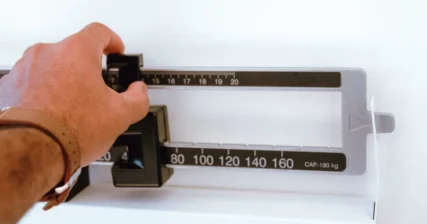Are you considering Semaglutide to lose weight or manage your blood sugar? Or, have you already started using it? If so, one of the most common questions people ask is, “Does Semaglutide make you tired?”
This is a common concern and a fairly common side effect of the medication.
For a more in-depth article about semaglutide, read Semaglutide: Weight Loss Miracle or Risky Medication?
In this article, I’ll focus on how the medication may lead to fatigue.

Feel Great While You Lose Weight!
The Amare Happy Fit Pack is specifically designed to help you reduce stress, improve mood and motivation, and boost your energy while reducing your appetite, mobilizing and burning body fat, and increasing your metabolic rate.* And it comes with a 90-day money-back guarantee!
Get $10 off when you order through the button below.
What is Semaglutide?
Semaglutide, known commercially as Ozempic, Wegovy, and Rybelsus, is a medication originally used to treat type 2 diabetes. Technically, it is a glucagon-like peptide-1 (GLP-1) receptor agonist.
However, its popularity comes from its impact on weight loss.
Semaglutide works by mimicking a hormone that targets areas in the brain called GLP-1 receptors that regulate appetite and food intake. Some categorize its effects as drug-induced anorexia.
The Fatigue Factor: Is Tiredness a Common Side Effect?
One of the common side effects of semaglutide, reported in clinical trials, is fatigue. But why does this happen?
Semaglutide can influence your energy levels in several ways.
First, it directly affects your blood sugar levels. Without the ups and downs of blood sugar, you may not notice significant changes in energy levels. Rather than being on a rollercoaster of high and low energy, you’ll notice that you feel more “in the middle” all day long.
Second, because semaglutide reduces appetite, you eat less. Many people end up with no desire to eat, which can become problematic. They end up starving themselves, which does lead to weight loss, but much of that weight loss become muscle loss.
As they lose muscle, the slow their metabolic rate, which makes them feel more lethargic. On top of that, the chronic calorie deprivation can lead to a chronically elevated stress response, like you see in adrenal fatigue. This adds to their fatigue.
Third, because your total food intake decreases so much, so does your micronutrient intake. You can quickly develop micronutrient deficiencies if you don’t supplement properly. These micronutrient deficiencies can make you feel extremely tired.
Finally, with Ozemipc and other semaglutide medications, side effects include nausea and other gastrointestinal side effects. The nausea and other side effects can lead to significant fatigue.
The bottom line is, you have to be intentional about eating nutrient-rich foods while using this medication. If you don’t, you’ll end up with significant fatigue and other health problems.
Managing Fatigue: Practical Tips
If you experience fatigue while on Semaglutide, there are several strategies you can adopt:
- Stay Hydrated: Drink plenty of water. Dehydration can exacerbate feelings of tiredness. Adding electrolytes to your water may also help.
- Monitor Blood Sugar Levels: Keep an eye on your blood glucose levels. This can help you understand if the tiredness is linked to low or fluctuating blood sugar.
- Adjust the Dosage Gradually: If you’re on a higher dose, talk to your healthcare provider about adjusting the medication gradually to help your body adapt.
- High-Protein Diet: Ensure you’re eating high-protein diet to support your energy needs and preserve muscle mass, even if your appetite has decreased.
- Supplement Appropriately: Taking supplements such as a high-quality multivitamin, fish oil, and using protein powders becomes essential when you cut back on your food intake so much.
Long-Term Effects and Reducing Risks
The long-term effects of Semaglutide, including its impact on energy levels, are still being studied.
Clinical trials have shown that while some side effects like nausea may decrease over time, it’s crucial to continually assess how the medication affects you personally.
Always discuss with your healthcare provider to find the best strategy for your situation.
The Bottom Line
In summary, while Semaglutide is an effective medication to help you treat type 2 diabetes and lose weight, it can cause side effects, including fatigue.
However, understanding how your body adjusts to the medication and implementing strategies to manage these side effects can make a significant difference.
Remember, managing your health should be a balanced approach. While medications like Semaglutide can be a powerful tool, they work best when combined with healthy lifestyle choices.
Semaglutide is not for everyone, and it’s absolutely possible to lose weight and restore your health without the medication.



